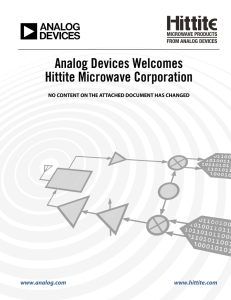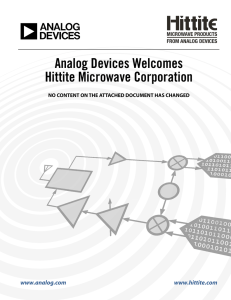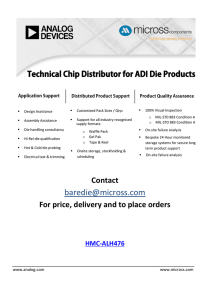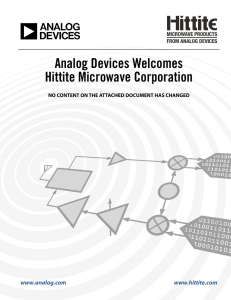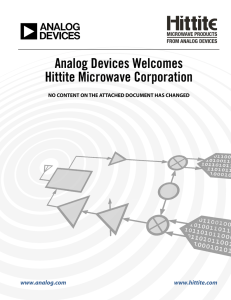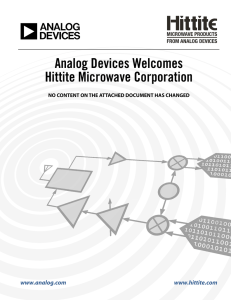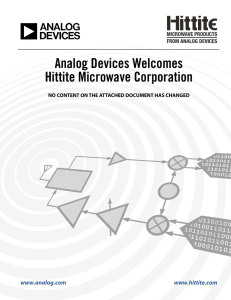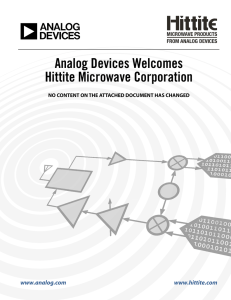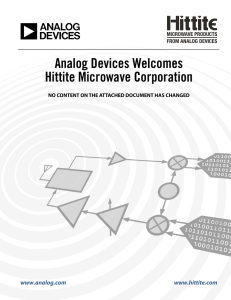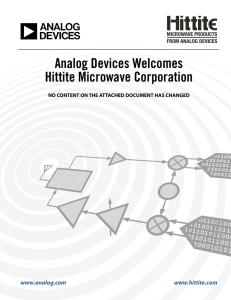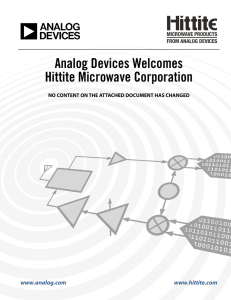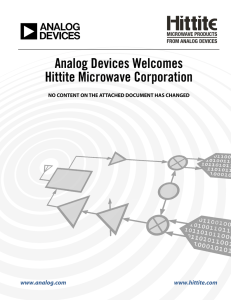Analog Devices Welcomes Hittite Microwave Corporation www.analog.com www.hittite.com
advertisement
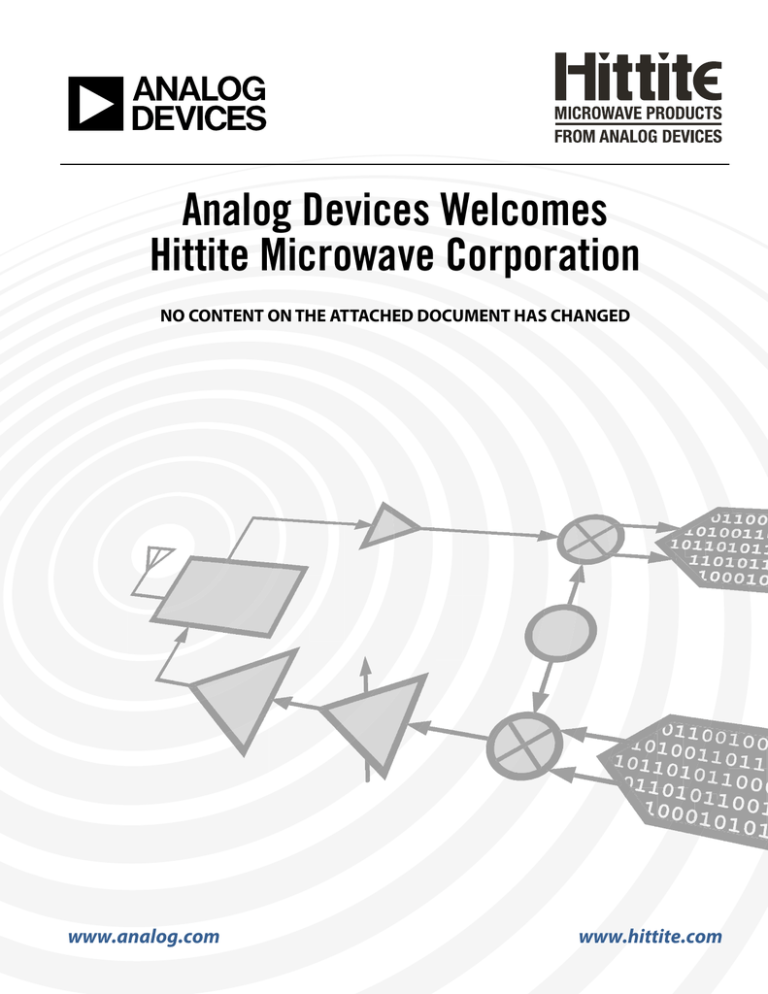
Analog Devices Welcomes Hittite Microwave Corporation NO CONTENT ON THE ATTACHED DOCUMENT HAS CHANGED www.analog.com www.hittite.com THIS PAGE INTENTIONALLY LEFT BLANK HMC-ALH313 v02.0209 LOW NOISE AMPLIFIERS - CHIP 1 GaAs HEMT MMIC LOW NOISE AMPLIFIER, 27 - 33 GHz Typical Applications Features This HMC-ALH313 is ideal for: Noise Figure: 3 dB • Point-to-Point Radios Gain: 20 dB • Point-to-Multi-Point Radios P1dB Output Power: +12 dBm • VSAT Supply Voltage: +2.5V @ 52 mA • Test Equipment & Sensors Die Size: 1.80 x 0.73 x 0.1 mm • Military & Space General Description Functional Diagram The HMC-ALH313 is a three stage GaAs MMIC HEMT Low Noise Amplifier die which operates between 27 and 33 GHz. The amplifier provides 20 dB of gain, a 3 dB noise figure and +12 dBm of output power at 1 dB gain compression while requiring only 52 mA from a +2.5V supply voltage. This amplifier die is ideal for use as a LNA or driver amplifier, and may be easily integrated into Multi-Chip-Modules (MCMs) due to its small size (1.30 mm2) . Electrical Specifi cations [1], TA = +25° C, Vdd= 2.5V, Idd = 52mA [2] Parameter Min. Frequency Range Gain Typ. Max. 27 - 33 18 Gain Variation over Temperature GHz 20 dB 0.03 dB / °C Noise Figure 3 Input Return Loss 12 dB Output Return Loss 14 dB 12 dBm 52 mA Output Power for 1 dB Compression 10 Supply Current 3.5 [1] Unless otherwise indicated, all measurements are from probed die [2] Adjust Vgg between -1V to +0.3V (Typ. -0.3V) to achieve Idd total = 52 mA 1 - 150 Units For price, delivery, and to place orders, please contact Hittite Microwave Corporation: 20 Alpha Road, Chelmsford, MA 01824 Phone: 978-250-3343 Fax: 978-250-3373 Order On-line at www.hittite.com dB HMC-ALH313 v02.0209 GaAs HEMT MMIC LOW NOISE AMPLIFIER, 27 - 33 GHz 20 4 15 10 3 2 1 0 0 26 27 28 29 30 31 32 33 34 26 27 28 FREQUENCY (GHz) 29 30 31 32 33 34 FREQUENCY (GHz) Input Return Loss vs. Frequency Output Return Loss vs. Frequency 0 -5 -5 RETURN LOSS (dB) 0 -10 -15 -20 -25 -10 -15 LOW NOISE AMPLIFIERS - CHIP 5 NOISE FIGURE (dB) GAIN (dB) 25 5 RETURN LOSS (dB) 1 Noise Figure vs. Frequency Linear Gain vs. Frequency -20 -25 -30 -30 26 27 28 29 30 31 FREQUENCY (GHz) 32 33 34 26 27 28 29 30 31 32 33 34 FREQUENCY (GHz) For price, delivery, and to place orders, please contact Hittite Microwave Corporation: 20 Alpha Road, Chelmsford, MA 01824 Phone: 978-250-3343 Fax: 978-250-3373 Order On-line at www.hittite.com 1 - 151 HMC-ALH313 v02.0209 LOW NOISE AMPLIFIERS - CHIP 1 Absolute Maximum Ratings Drain Bias Voltage +5 Vdc Gate Bias Voltage -1 to +0.3 Vdc RF Input Power -3 dBm Channel Temperature 180 °C Storage Temperature -65 to +150 °C Operating Temperature -55 to +85 °C ELECTROSTATIC SENSITIVE DEVICE OBSERVE HANDLING PRECAUTIONS Outline Drawing Die Packaging Information [1] Standard Alternate GP-5 (Gel Pack) [2] [1] Refer to the “Packaging Information” section for die packaging dimensions. [2] For alternate packaging information contact Hittite Microwave Corporation. 1 - 152 GaAs HEMT MMIC LOW NOISE AMPLIFIER, 27 - 33 GHz NOTES: 1. ALL DIMENSIONS ARE IN INCHES [MM]. 2. TYPICAL BOND PAD IS .004” SQUARE. 3. BACKSIDE METALLIZATION: GOLD. 4. BACKSIDE METAL IS GROUND. 5. BOND PAD METALLIZATION: GOLD. 6. CONNECTION NOT REQUIRED FOR UNLABELED BOND PADS. 7. OVERALL DIE SIZE ±.002” For price, delivery, and to place orders, please contact Hittite Microwave Corporation: 20 Alpha Road, Chelmsford, MA 01824 Phone: 978-250-3343 Fax: 978-250-3373 Order On-line at www.hittite.com HMC-ALH313 v02.0209 GaAs HEMT MMIC LOW NOISE AMPLIFIER, 27 - 33 GHz Pad Number Function Description 1 RFIN This pad is AC coupled and matched to 50 Ohms. 2 RFOUT This pad is AC coupled and matched to 50 Ohms. 3 Vdd Power Supply Voltage for the amplifier. See assembly for required external components. 4 Vgg Gate control for amplifier. Please follow “MMIC Amplifier Biasing Procedure” application note. See assembly for required external components. Die bottom GND Die bottom must be connected to RF/DC ground. Interface Schematic For price, delivery, and to place orders, please contact Hittite Microwave Corporation: 20 Alpha Road, Chelmsford, MA 01824 Phone: 978-250-3343 Fax: 978-250-3373 Order On-line at www.hittite.com LOW NOISE AMPLIFIERS - CHIP 1 Pad Descriptions 1 - 153 HMC-ALH313 v02.0209 Assembly Diagram LOW NOISE AMPLIFIERS - CHIP 1 GaAs HEMT MMIC LOW NOISE AMPLIFIER, 27 - 33 GHz Note 1: Bypass caps should be 100 pF (approximately) ceramic (single-layer) placed no farther than 30 mils from the amplifier Note 2: Best performance obtained from use of <10 mil (long) by 3 by 0.5mil ribbons on input and output. 1 - 154 For price, delivery, and to place orders, please contact Hittite Microwave Corporation: 20 Alpha Road, Chelmsford, MA 01824 Phone: 978-250-3343 Fax: 978-250-3373 Order On-line at www.hittite.com HMC-ALH313 GaAs HEMT MMIC LOW NOISE AMPLIFIER, 27 - 33 GHz 1 Mounting & Bonding Techniques for Millimeterwave GaAs MMICs The die should be attached directly to the ground plane eutectically or with conductive epoxy (see HMC general Handling, Mounting, Bonding Note). 50 Ohm Microstrip transmission lines on 0.127mm (5 mil) thick alumina thin film substrates are recommended for bringing RF to and from the chip (Figure 1). If 0.254mm (10 mil) thick alumina thin film substrates must be used, the die should be raised 0.150mm (6 mils) so that the surface of the die is coplanar with the surface of the substrate. One way to accomplish this is to attach the 0.102mm (4 mil) thick die to a 0.150mm (6 mil) thick molybdenum heat spreader (moly-tab) which is then attached to the ground plane (Figure 2). 0.102mm (0.004”) Thick GaAs MMIC Wire Bond 0.076mm (0.003”) RF Ground Plane Microstrip substrates should be placed as close to the die as possible in order to minimize bond wire length. Typical die-to-substrate spacing is 0.076mm to 0.152 mm (3 to 6 mils). 0.127mm (0.005”) Thick Alumina Thin Film Substrate Figure 1. Handling Precautions Follow these precautions to avoid permanent damage. Storage: All bare die are placed in either Waffle or Gel based ESD protective containers, and then sealed in an ESD protective bag for shipment. Once the sealed ESD protective bag has been opened, all die should be stored in a dry nitrogen environment. Cleanliness: Handle the chips in a clean environment. DO NOT attempt to clean the chip using liquid cleaning systems. Static Sensitivity: strikes. 0.102mm (0.004”) Thick GaAs MMIC Wire Bond 0.076mm (0.003”) RF Ground Plane Follow ESD precautions to protect against ESD Transients: Suppress instrument and bias supply transients while bias is applied. Use shielded signal and bias cables to minimize inductive pick-up. LOW NOISE AMPLIFIERS - CHIP v02.0209 0.150mm (0.005”) Thick Moly Tab 0.254mm (0.010”) Thick Alumina Thin Film Substrate Figure 2. General Handling: Handle the chip along the edges with a vacuum collet or with a sharp pair of bent tweezers. The surface of the chip has fragile air bridges and should not be touched with vacuum collet, tweezers, or fingers. Mounting The chip is back-metallized and can be die mounted with AuSn eutectic preforms or with electrically conductive epoxy. The mounting surface should be clean and flat. Eutectic Die Attach: A 80/20 gold tin preform is recommended with a work surface temperature of 255 °C and a tool temperature of 265 °C. When hot 90/10 nitrogen/hydrogen gas is applied, tool tip temperature should be 290 °C. DO NOT expose the chip to a temperature greater than 320 °C for more than 20 seconds. No more than 3 seconds of scrubbing should be required for attachment. Epoxy Die Attach: Apply a minimum amount of epoxy to the mounting surface so that a thin epoxy fillet is observed around the perimeter of the chip once it is placed into position. Cure epoxy per the manufacturer’s schedule. Wire Bonding RF bonds made with 0.003” x 0.0005” ribbon are recommended. These bonds should be thermosonically bonded with a force of 40-60 grams. DC bonds of 0.001” (0.025 mm) diameter, thermosonically bonded, are recommended. Ball bonds should be made with a force of 40-50 grams and wedge bonds at 18-22 grams. All bonds should be made with a nominal stage temperature of 150 °C. A minimum amount of ultrasonic energy should be applied to achieve reliable bonds. All bonds should be as short as possible, less than 12 mils (0.31 mm). For price, delivery, and to place orders, please contact Hittite Microwave Corporation: 20 Alpha Road, Chelmsford, MA 01824 Phone: 978-250-3343 Fax: 978-250-3373 Order On-line at www.hittite.com 1 - 155
